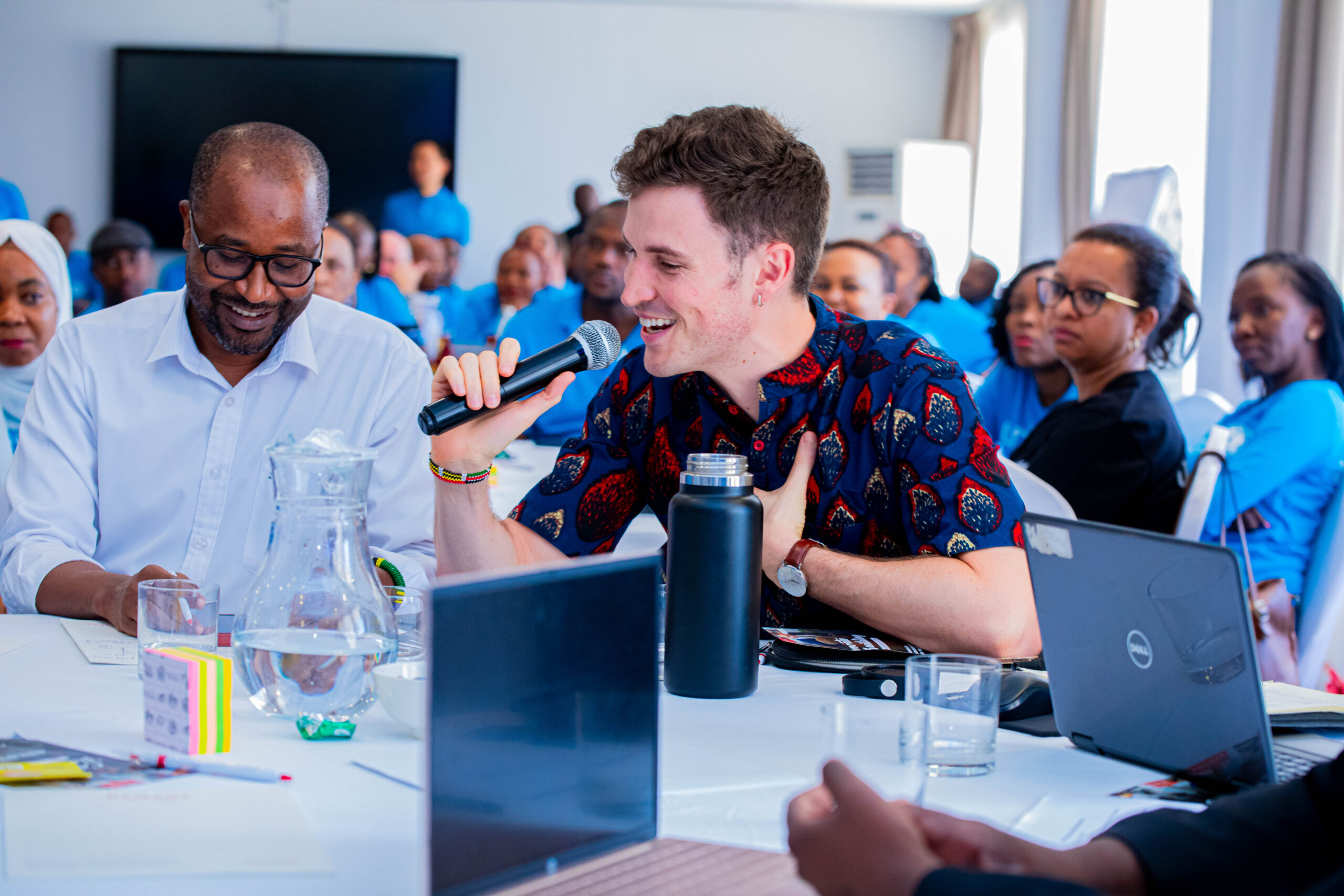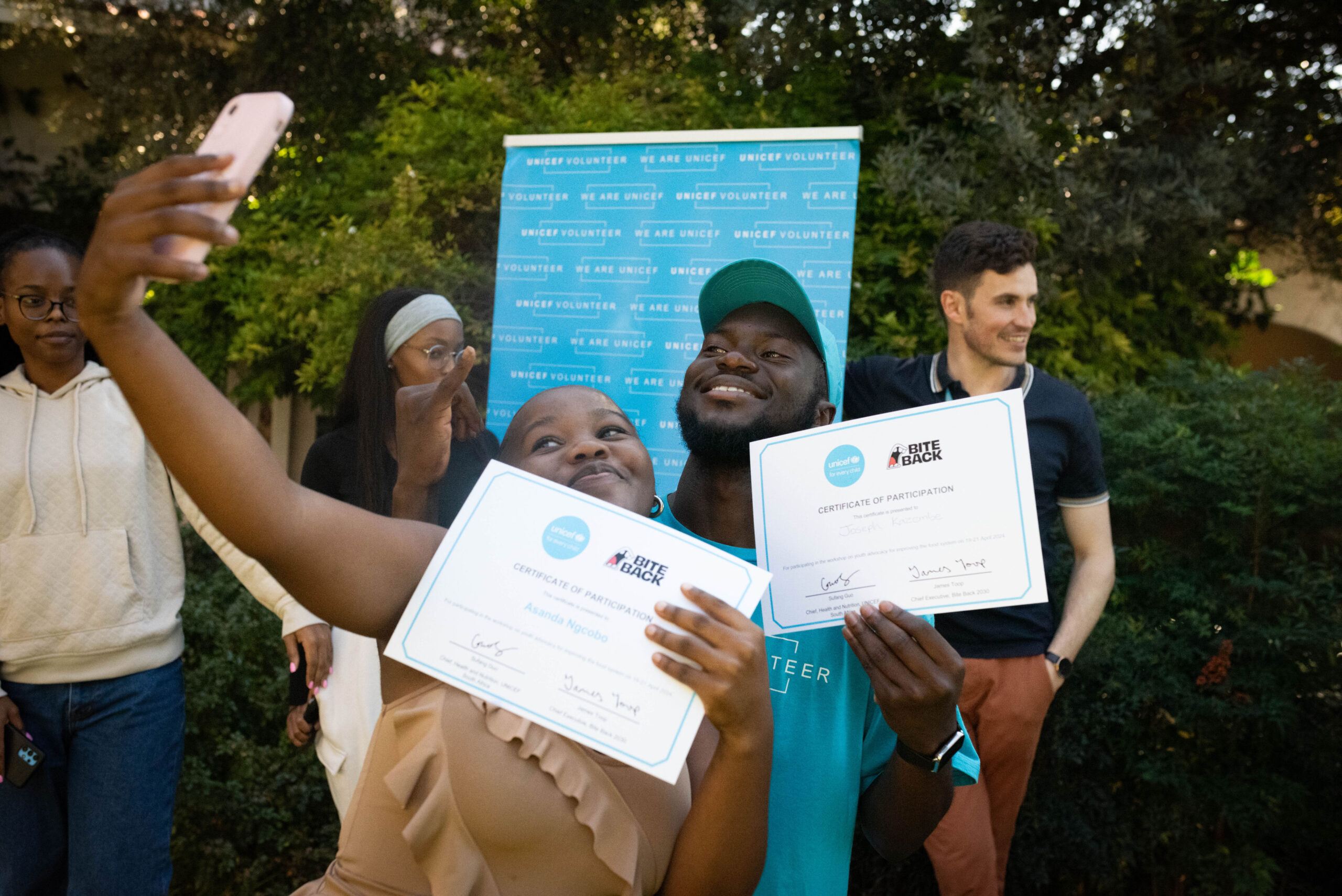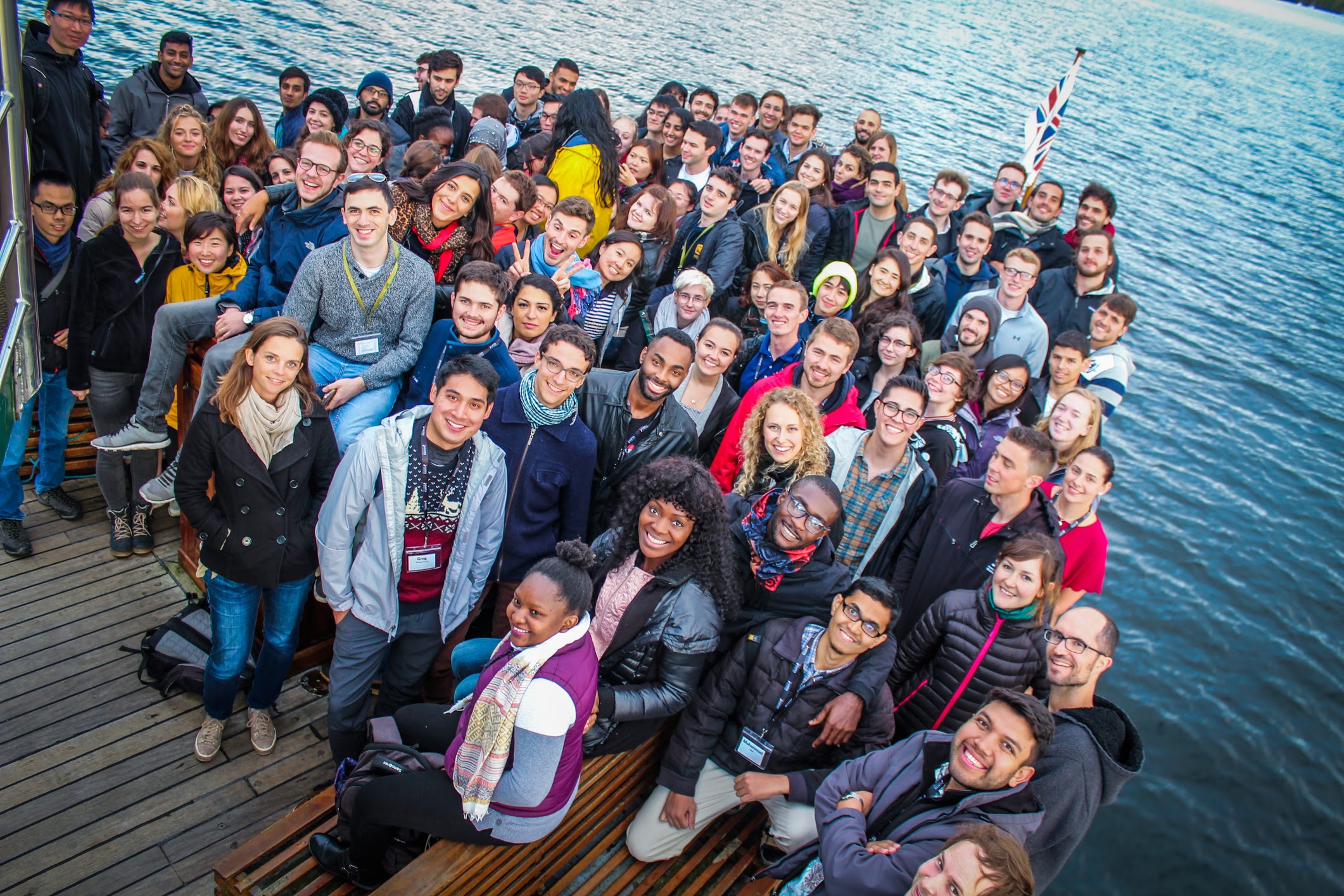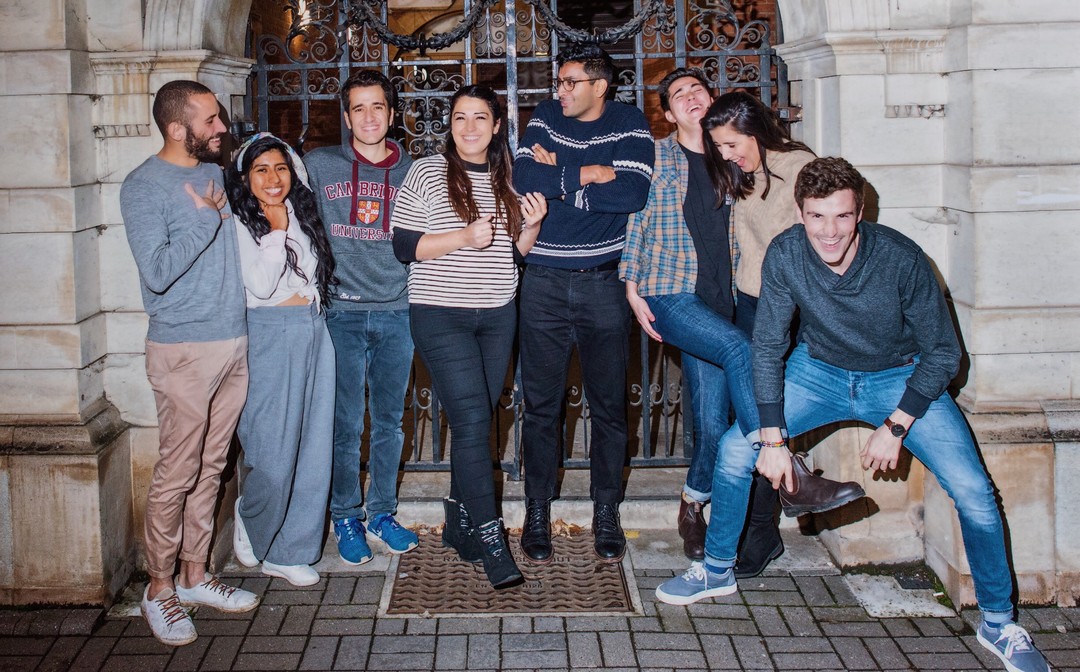
D'Arcy Williams talks about his new role as CEO of food justice charity Bite Back and his path to getting there.
Usually, youth advocacy can be seen as quite tokenising and fluffy, but this is a refreshing model that elevates young people’s voices and stories to combat Big Food’s misinformation tactics and help to reshape the narrative.
D'Arcy Williams
D’Arcy Williams [2019] has just been appointed CEO of Bite Back, a UK-based charity campaigning to ensure that every young person has access to healthy and nutritious food.
After leaving Cambridge, D’Arcy Williams worked for more than five years with UNICEF at the global and country level fighting to improve food systems for children, most recently as a Nutrition Specialist in Tanzania.
That journey was sparked through a work placement offered as part of his MPhil in Public Policy (MPP) at Cambridge which had him focus on supporting UNICEF HQ in New York to develop their global policy strategy for the intersection of nutrition and climate. Towards the end of that experience, at the height of the COVID-19 pandemic, UNICEF turned around and offered him a full-time role to help build their global agenda to prevent childhood overweight and obesity. “I had a bit of imposter syndrome at the time, given the technical area was quite new to me,” says D’Arcy, “but then the strategy they were developing was rooted in leveraging policy change to transform food systems to push back against the structural drivers of obesity. And that intrigued me.”
At the time, UNICEF was not known for its work on childhood obesity and so there was an opportunity to grow within the role, and to really build the programmatic, communication and advocacy strategy from the ground up. “Childhood obesity had historically been framed as an individual behavioural problem despite being so determined by large commercial interests. I learned immensely during that time, especially from an excellent supervisor and mentor, who quickly brought me up to speed regarding how this agenda was about supporting governments to regulate food environments and to push back again the food and beverage industry.” says D’Arcy. “It immediately became clear to me that this was a serious issue of children’s rights, and about a global fight for food justice.”
Early on, he came across Bite Back while representing UNICEF at a global obesity event and was instantly inspired by one of their powerful youth campaigners. A relatively new UK-based charity, Bite Back had recently entered the public health scene launching punchy advocacy campaigns for food justice reform through the lens of young people’s stories of lived experience. “Their youth campaigner first presented Bite Back’s viral Triple Dipped Chicken video, and then went on to speak passionately about reframing the entire debate on child obesity around industry’s manipulative tactics to exploit children’s health,” says D’Arcy.
Inspired, he then got to work forging a global partnership between UNICEF and Bite Back to eventually launch “Fix My Food”, a global youth-led campaign that harnessed Bite Back’s youth voice creativity to support UNICEF’s food policy efforts in 10 countries around the world. “Usually, youth advocacy can be seen as quite tokenising and fluffy,” explains D’Arcy. “But this was a refreshing model that elevated young people’s voices and stories to combat Big Food’s misinformation tactics and help to reshape the narrative. And it really pushed UNICEF to be more creative with our own advocacy.”

UNICEF workshop on Nutrition and Food Environments, held at the Garden Court, OR Tambo, on 19 to 21 April 2024. Photograph by Lulutho Madolo.
After four years helping UNICEF to scale this food policy agenda from 10 to more than 50 countries globally, D’Arcy was promoted to a role with the UNICEF Tanzania Country Office. It was an exciting opportunity to work on the ground as a Nutrition Specialist advising the government on early childhood nutrition and nutrition governance, including supporting the Prime Minister’s Office with progressive food system policies – such as the sugar tax – to help quell the growing tide of overweight and obesity among children and adolescents.
With his freshly announced appointment as CEO, D’Arcy will soon be leaving UNICEF and starting a new chapter, returning to the UK in October. “Though it will be bittersweet to leave the amazing team at UNICEF and beautiful Tanzania – the idea of working alongside the young people at Bite Back is just so exhilarating and I cannot wait to begin,” says D’Arcy. He will also be continuing his current part-time Doctorate of Public Health (DrPH) in Epidemiology & Population Health at the London School of Hygiene & Tropical Medicine (LSHTM), where he has been studying while working since 2022.
Childhood
D’Arcy was born in London to a Welsh father and Irish-English-American mother. At the time his parents were living in Malawi where his father was working for UNICEF on how to better measure children’s health outcomes as a statistician, while his mother was doing a PhD in international nutrition. Their example was clearly an inspiration to D’Arcy who says: “They are both my heroes and, clearly, the acorn didn’t fall far from the tree. All except the statistics part,” he laughs. “My dad was doing stats back in the stone age when computers didn’t exist, let alone the software. Let’s just say those courses weren’t my favourite at Cambridge or McGill!”
After Malawi, the family moved to Ghana where D’Arcy went to an international school in Accra. “That internationalism and diversity really set the tone for the rest of my life,” he says. At the age of eight, the family moved to Washington DC and D’Arcy entered the local DC Public School (DCPS) system in what he describes as a hyper-diverse community. He says he learned a lot of life lessons there and still treasures his good friends from all walks of life.
He had high expectations of himself, in part due to the model his parents had provided. “They were very inspiring, but never put any explicit pressure on me. It was more of a ‘lead by example’ type of vibe,” he says. In addition to his academic studies, his leadership skills and commitment to public service manifested themselves early: he was elected Student Government President and was also captain of his soccer teams [and eventually recruited to play at university]. “No matter what I did I was becoming more and more keen to make people’s lives better,” he says. “It felt very natural and fulfilling.” Towards the end of high school D’Arcy was selected to represent Washington DC for the prestigious United States Senate Youth Program (USSYP) designed for outstanding high school students who are interested in pursuing careers in public services.
Undergraduate studies and leadership
D’Arcy began his undergraduate studies at McGill University in Canada, where he pursued an Honours BA in International Development Studies & Political Science. He embraced the global environment of McGill and fell in love with his coursework. Early on he was elected President of his college residence and played on the Men’s Varsity Soccer team until he had to withdraw due to injuries. In his final years at McGill he co-founded a social business, Heart City Apparel, which used street art to support homeless charities in cities around the world. He was also elected President of UNICEF McGill’s student club, and raised more than $18,000 for the Syrian Refugees Crisis, the highest amount ever raised in one year by any UNICEF campus club. All these extracurricular activities resulted in D’Arcy being awarded the McGill Scarlet Key for excellence in student leadership and outstanding contributions to the wider community.
When it came to coursework, D’Arcy initially had to work a lot harder than most. Given DCPS was – at the time – ranked the second worst-performing public school system in America, his high school education had not fully prepared him for independent study at McGill. However, he soon adjusted, and his course opened a whole new range of possibilities to him.
In his second year, he won a McGill Arts Internship Office scholarship to pursue a public health internship in Nepal, working with a local social enterprise to implement a micronutrient powder programme for improved child nutrition. They sent him to the mountainous Sankhuwasabha District in eastern Nepal, where he got a crash course in the realities of rural health, social behaviour change and community development. “People always asked me if I had time to enjoy Nepal’s famous hikes, and I joked I didn’t need to since my job had me trekking for days to reach families in the most hard-to-reach communities,” he says.
D’Arcy also benefited from a semester of taught research in Kenya, Uganda and Tanzania as part of the McGill East Africa Field Study Semester. He spent four months camping across East Africa and learning about development and environmental conservation from local academics. “It was amazing – imagine an intensive anthropology course taught by an incredible Maasai PhD student while camping in the Maasai Mara National Reserve,” he says.
Upon graduating McGill, D’Arcy was selected for the Pascal International Fellowship which enables one McGill and one Yale graduate each year to work at the Clinton Global Initiative. There he gained high level global health policy exposure and helped facilitate multisectoral partnerships to address pressing global health challenges. Soon after, he took an entry level role at Population Services International in Washington DC, supporting their creative social franchising and social marketing global health model. It was around this time where D’Arcy was also campaigning for Senator Bernie Sanders during the 2016 Democratic Party presidential primaries, particularly inspired by the Senator Sanders’ commitment to universal healthcare for all and combating corporate interests on behalf of everyday people.
Journey to Cambridge
After some time working at the global health policy level, D’Arcy was keen to get more hands-on community health experience. After some recommendations from colleagues, he joined the Peace Corps as a Community Health Educator and was sent to the rural French-speaking village of Baré-Bakem in Cameroon, where he spent two years working alongside local health professionals on malaria, HIV/AIDs, youth development and nutrition programmes.
 He says his supervisors and the training he received were excellent. “It was very intensive and quite humbling, involving an expansive community priorities assessment that taught me a lot about rural community health,” he says. This involved interviewing hundreds of community members on their priorities and building programmes based on those. “It was an eye-opener when it came to better understanding health inequalities at a global level and provided an opportunity to really practice values of participatory development, which are often missing in this line of work. By supporting my community health worker counterparts from behind the scenes while they moved mountains to improve the health of their community, I learned more during those two years than any degree,” he says.
He says his supervisors and the training he received were excellent. “It was very intensive and quite humbling, involving an expansive community priorities assessment that taught me a lot about rural community health,” he says. This involved interviewing hundreds of community members on their priorities and building programmes based on those. “It was an eye-opener when it came to better understanding health inequalities at a global level and provided an opportunity to really practice values of participatory development, which are often missing in this line of work. By supporting my community health worker counterparts from behind the scenes while they moved mountains to improve the health of their community, I learned more during those two years than any degree,” he says.
After that experience, D’Arcy moved to Senegal where he worked as a teacher and soccer coach while applying to graduate school. It was here where he co-founded another social enterprise with Senegalese and American friends, Routed (Roo-tid) – a remote working company which partnered with Impact Hub to facilitate co-working and co-living trips to Senegal while re-investing profits into the local social impact ecosystem.
As he began to plan for his graduate studies, D’Arcy says he was drawn to Gates Cambridge for its focus on building a community that cares about more than just its own members. He remembers being incredibly nervous at his Gates Cambridge interview as he was scared to want something so much. He adds that the Gates Cambridge experience lived up to his expectations and he immersed himself in his cohort [pictured at orientation above].
 “I was surrounded by the most brilliant, humble people who cared a lot and wanted to have a positive impact in so many different fields,” he says. “Imagine a neuroscientist who is also a stand-up comedian who started a comedy show charity for refugee relief? That’s the Gates community in a nutshell,” he says speaking of his friend and fellow Gates Scholar, Cansu Karabiyik who roped D’Arcy into joining Laugh 4 Change [the Laugh 4 Change committee is pictured right], a Cambridge student-run charity that raised thousands of pounds for direct refugee relief aid in Greece. D’Arcy also fell in love with his Clare Hall College graduate-only community. “Clare Hall was small but mighty, with incredible grad students from around the world – and also by far the best food in Cam,” he says.
“I was surrounded by the most brilliant, humble people who cared a lot and wanted to have a positive impact in so many different fields,” he says. “Imagine a neuroscientist who is also a stand-up comedian who started a comedy show charity for refugee relief? That’s the Gates community in a nutshell,” he says speaking of his friend and fellow Gates Scholar, Cansu Karabiyik who roped D’Arcy into joining Laugh 4 Change [the Laugh 4 Change committee is pictured right], a Cambridge student-run charity that raised thousands of pounds for direct refugee relief aid in Greece. D’Arcy also fell in love with his Clare Hall College graduate-only community. “Clare Hall was small but mighty, with incredible grad students from around the world – and also by far the best food in Cam,” he says.
He was able to shape his Cambridge MPP around health policy and was also elected Class Representative for the course and enjoyed the MPP community which stemmed from all corners of the globe. Their course would eventually be affected by both teacher strikes and the COVID pandemic, which forced D’Arcy’s work placement with UNICEF to go fully remote during lock down in New York. Clare Hall eventually helped him to return to Cambridge to finish writing up his final papers and research project.
D’Arcy says he could not have done his Master’s without Gates Cambridge. “If I had not received the Gates Cambridge scholarship, I would not have gone to Cambridge and not have done a work placement with UNICEF focused on the food systems space,” he says. “And by that measure, I would not be where I am now, about to start my new role as CEO of Bite Back fighting against food injustice in both the UK and abroad. Cambridge set me on an accelerated path to my dream career on the front lines of health equity, and Gates Cambridge opened that door.”












